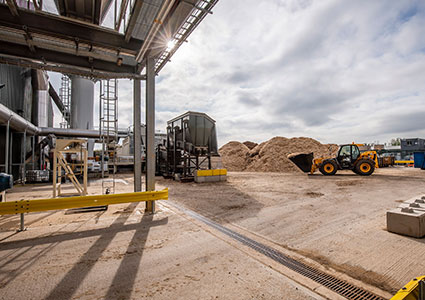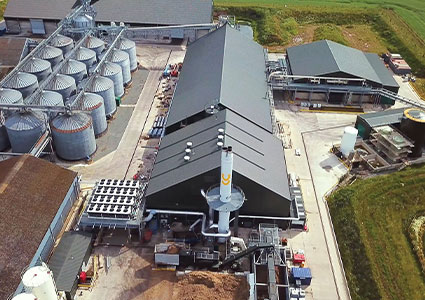Through innovation and expertise in rapeseed processing, Yelo is paving the way for a more sustainable future
From its first-of-its-kind crushing facility in the heart of England, Yelo Enterprises (Yelo) processes only 100 percent UK-grown, Red Tractor farm assured rapeseed to produce high-quality, proudly British, refined rapeseed oil. This approach supports UK farmers finding a domestic market for their crop, as well as contributes to improved food security and reduces imports thereby reducing transport emissions.
 The processing facility only mechanically presses the UK rapeseed and physically refines the subsequent crude oil produced into the finished product. This differs totally from all the other UK processing facilities that use the hydrocarbon hexane to solvent extract the maximum amount of rapeseed oil from the seed. The facility also has a combined heat and power plant, processing biomass wood that ensures that over 70 percent of its energy needs are met sustainably, unlike all other UK located facilities.
The processing facility only mechanically presses the UK rapeseed and physically refines the subsequent crude oil produced into the finished product. This differs totally from all the other UK processing facilities that use the hydrocarbon hexane to solvent extract the maximum amount of rapeseed oil from the seed. The facility also has a combined heat and power plant, processing biomass wood that ensures that over 70 percent of its energy needs are met sustainably, unlike all other UK located facilities.
Alongside the production of the refined rapeseed oil (around 40 percent of the actual whole rapeseed), Yelo has launched NovaPro, a high energy rumen bypass that is used as animal feed for dairy cows, delivering high performance at a reduced cost. Several years ago, an ADAS report commissioned by Yelo outlined that nearly 250,000 metric tons of imported soy products were still used in UK dairy feed. NovaPro is quickly replacing this legacy soy use with its bespoke product, which is highly digestible, has a higher energy content, and maximizes milk production by meeting the cow’s demand for DUP, all while being UK-sourced.
Healthy and homegrown
To learn more about Yelo’s revolutionary processing facility and its operations, we sit down with Doug King, CEO and Chairman. With more than 30 years’ experience in commodities, Doug has guided Yelo through the construction of its greenfield site and grown the business to its current position of processing approximately 25 percent of the UK’s annual rapeseed crop.
“Unlike any other processing facilities, our site in Stratford-upon-Avon, mechanically presses the rapeseed rather than using a chemical solvent extraction process,” Doug begins. “Our supply chain differs dramatically from our competitors, as they tend to be strategically placed in locations, such as ports, to allow flexibility on their feedstock intake.
“However, we’re in the middle of the country and process only UK grown, Red Tractor approved rapeseed, meaning our supply chain is incredibly local and ensures the quality of the feedstock, rapeseed, is grown to UK standards. We have relationships with strategic suppliers who originate the rapeseed on our behalf.”
Believing that we are what we eat, Yelo strives to keep processing to a minimum, using mechanical pressing to preserve the micronutrients held within the energy-rich rapeseed plant. As the UK’s only pressed, refined rapeseed oil, Yelo’s product has the lowest saturated fat levels of all vegetable oils and is rich in vitamin E, a key antioxidant that strengthens the immune system.
Not only is Yelo rapeseed oil one of the healthiest homegrown options, but it’s also one of the most versatile. With a high flash point that protects the oil from burning when shallow or deep frying, baking, or roasting, the oil can be used in both savory and sweet recipes, or in dips, sauces, and mayonnaise.
Iterating the process, Doug explains: “It’s important that we don’t confuse cold pressed rapeseed oil, which is a darker oil used in salad dressing, with the hot-pressed oil we produce. We use heat to prepare the rapeseed to be able to process at scale, subsequent crude oil is refined using physical refining aids such as cellulose to bring the oil to refined specification. Most of our oil then heads into further processing to create products like spreadable butters and mayonnaise, which traditionally consists of at least 50 percent refined rapeseed oil.
“Whereas many competitors use a solvent called hexane to remove as much oil as possible, we operate a very different process that uses four second presses to retrieve the oil after the pre-pressing stage. Mechanical processing isn’t as efficient as its chemical alternative, but it removes the need for a harmful hydrocarbon in this production of food as we use physical refining additives to achieve the industry requirements for color and quality.”
Optimizing operations 
Turning to how the company began producing NovaPro, Doug continues: “We started working with specialists on bypass technology, which maximizes a cow’s milk yield by wrapping the protein in a material that passes the maximum amount of digestible protein into its second stomach. We’re currently using a patented technology to wrap our protein in xylig, a natural wood sugar, to produce NovaPro. Its positive reception in the UK dairy industry is providing an alternative domestic product that removes the need for soy and soypass products in a dairy feed diet. Winning the Dairytech Innovation award in 2022 is testament to NovaPro’s revolutionary potential.”
At Yelo, it’s a delicate balancing act between squeezing the maximum amount of oil from the rapeseed while being careful not to use too much heat and processing severity that can reduce the effectiveness of the key product by denaturing the protein. The quality control and assurance systems used at the site ensure all finished products can be traced back to the raw material batch from which they came.
“As a greenfield site, we’ve built the facility from the ground up, breaking ground in 2016 and seemingly continuing ever since,” Doug elaborates. “It is fully integrated and located next to an adjoining agricultural storage facility to ensure rapeseed can be stored after harvest and optimize the flow of feedstock into our refinery. Around 75 percent of our heating power is generated through renewable power, and we have our own renewable power plant integrated into the site.
“Demand for rapeseed oil has dramatically increased over the last five years or so, accelerated by the war in Ukraine and the UK’s ambition to move away from imported sunflower oil. To meet such demand, we’ve de-bottlenecked the facility and increased production of our processed oil. The lower processing impact of our pressed refined oil means that our refined oil has a longer shelf life than extracted refined rapeseed oil in the traditional markets of crisps and snacks. The UK uses far less imported sunflower oil as a result. When we started the project, we were processing around ten percent of the UK’s rapeseed crop, but today we process around 25 percent of the crop, which is estimated to total around 900,000 tons this year.”
Best of British
As our conversation closes, Doug shares his view on the current market and his goals for Yelo moving forward. “The current price variation of rapeseed in Europe and the UK is concerning, and farmers are growing less rapeseed since the EU ban on neonicotinoid pesticides, which are particularly effective against a devastating pest, cabbage stem flea beetles,” he says.
“In the longer term, we’d love to see all major supermarkets follow Marks and Spencer and Waitrose in removing soya in the production of all their dairy offerings. NovaPro would then be a fantastic alternative. Since inception with Novapro, at least a quarter of soya has been replaced by our product in dairy feed: why not make the UK’s dairy feed soy free?”
Doug concludes: “As one of very few independent, fully integrated processors in the world, we don’t have any intention of being sucked into a major conglomerate and we’re instead focused on ensuring the site runs efficiently and sustainably for many years to come, championing the best of British innovation.”

